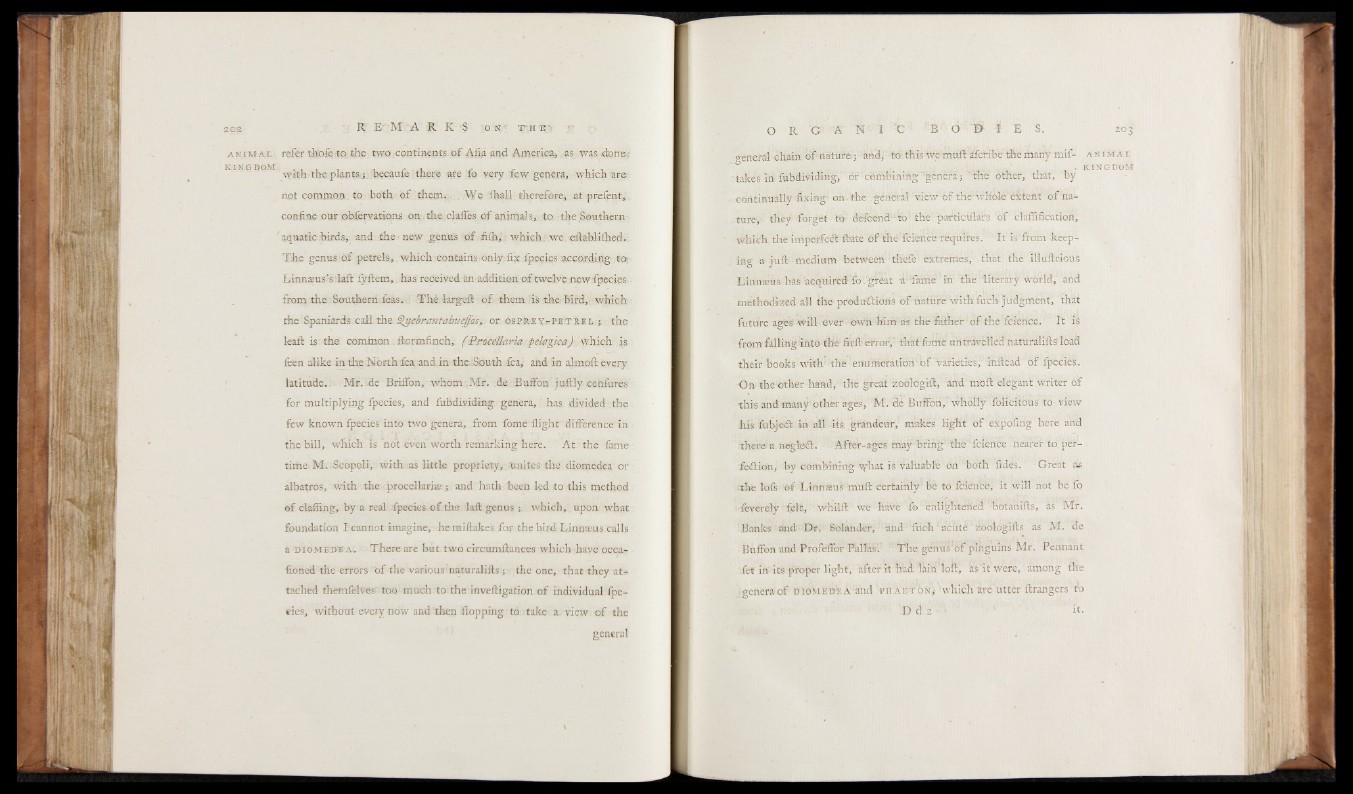
202 R 'E ' M ' A R K "S o n ' t ;h Ü59
a n i m a l refer tkofe tp die two continents, o f Alia and America^ as . Was Jones'
k i n g d o m , the plants.j. becaufe there are f o very few genera, which are
not common to both o f them .. W e fhall therefore, at prefent,.
confine our obfervations o n . the, claffes o f animals, to : the .Southern -
''aquaticbirds, and the new .genus o f fi-fhv which, we. eftablifhed..
T h e genus o f petrels, which eontainj^only. fix fpecies according to>
Linna;us’s laft lyftem,. has received an addition of twelve new fpecies
from the Southern Teas. : T h é largeft o f them is the Bird,' which
the Spaniards call the ^uebnantabuiffas', or Ospr kVc-p e.t r e l - the
k ali isr the common: ftormfinch, fProcellaria felagicd) which is
feen alike in the North fea and in the~Söuth &a,; and in ahnoft every
latitude. Mr. he Briflbn, whom Mr. d eB u f fo n ju f t ly cenfures
for multiplying fpecies, and fubdividing genera, has. divided the
few known fpecies into two genera, from fome flight difference in
the bill, which' is not. even worth remarking here. ' A t the fame
time. M . Scopoli, with as littfe propriety, 'unites the diomedea 'or
albatros, with the procellariae j and hath been led to this method
o f claffing, by a real fpecies of the laft genus j. which, upon what
foundation I cannot imagine, he miftakes for the bird Linnaaus calls
a d i o m e d e a . There are but two circumftances which have occa-
fioned the errors o f the various1 naturalifts j the one, that they attached
themfelves: too much to the inveftigation o f individual fpe-
eies, without every now and then flopping to take a . view of the
general
O R G A N I "C B O D' I E S. 203
general chain, o f nature- 3an’d, to this we mdft dfcribe the many mif- a n im a l
• . K I N G D O M
tabes in. fu-bdiv-iding, ' or combining 'genera; the other, that, by
C o n t i n u a l l y fixing' oh -the".general view óf the- wholeextent o f nature,
they forget--to1 ikicend to the particulars of claffification,
which the imperfect ftate o f the'fciencerequites. It is from keeping
a j u f t medium between -thefe extremes, that the i l l u f t r i o u s
Linnaeus has acquired fo/great tiJ 'fame1 in the literary world,'and
methodized all the- produftions o f nature with fuch judgment, that
future ages' will , ever own-him as the father' o f the fcience. It is
from falling into the firft error, thstfomè' untravèlléd naturalifts' load
their books with the enumeration of. varieties, -inftead' of fpecies.
O h the other hand, the great zoologi-ft, and moft elegant writer of
this and many other ages, M . dè Buffon,: wholly felicitous to view
his fubjeift in all its grandeur, makes light o f expo’fing here and
there a negledt. After-ages may-bring 'the ‘ fcience nearer to perfection,
by combining lyhat is valuable on both fidês. Great as
;the lofs ’o f Linnaeus muft certainly1' be to fcience, it will not be fo
■ feverel-y felt, whilft we have\ fo' enlightened -hotamfts, is' Mr.
Banks and Dr: Solander, and iucli acute zoologifts as M. de
Buffon and Profeffor Pallas’. The genus'of pinguïns Mr. Pennant
fet in its proper light, after it had lain loft, as it were, among the
.genera of DioMED-feA’and ' p h a e t o n , ■ which are utter ftrangers to
D d'2 '-k 1 ' ‘ it.